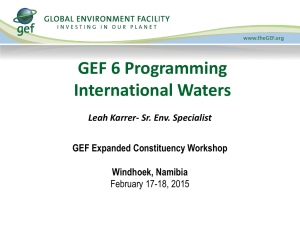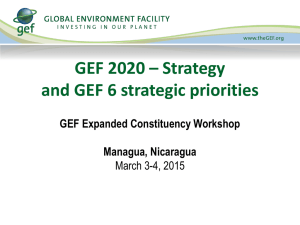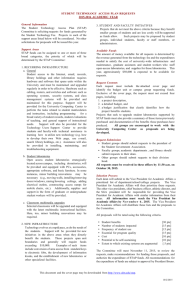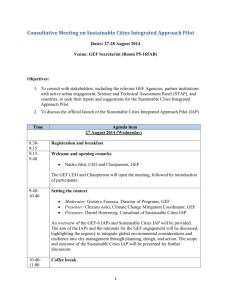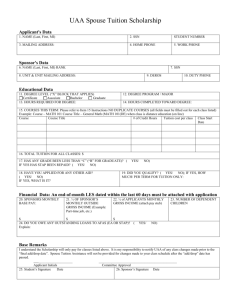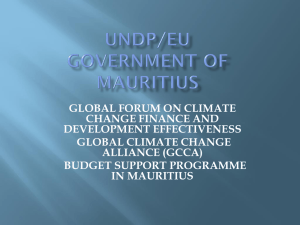2014-02-26-proposed
advertisement
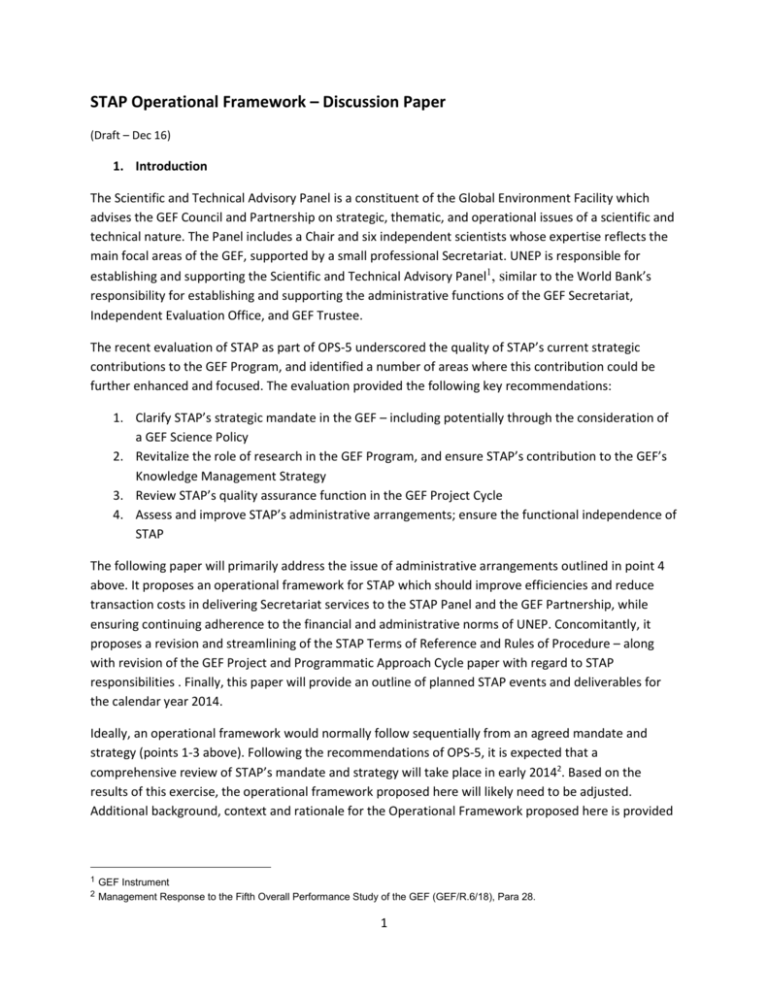
STAP Operational Framework – Discussion Paper (Draft – Dec 16) 1. Introduction The Scientific and Technical Advisory Panel is a constituent of the Global Environment Facility which advises the GEF Council and Partnership on strategic, thematic, and operational issues of a scientific and technical nature. The Panel includes a Chair and six independent scientists whose expertise reflects the main focal areas of the GEF, supported by a small professional Secretariat. UNEP is responsible for establishing and supporting the Scientific and Technical Advisory Panel1, similar to the World Bank’s responsibility for establishing and supporting the administrative functions of the GEF Secretariat, Independent Evaluation Office, and GEF Trustee. The recent evaluation of STAP as part of OPS-5 underscored the quality of STAP’s current strategic contributions to the GEF Program, and identified a number of areas where this contribution could be further enhanced and focused. The evaluation provided the following key recommendations: 1. Clarify STAP’s strategic mandate in the GEF – including potentially through the consideration of a GEF Science Policy 2. Revitalize the role of research in the GEF Program, and ensure STAP’s contribution to the GEF’s Knowledge Management Strategy 3. Review STAP’s quality assurance function in the GEF Project Cycle 4. Assess and improve STAP’s administrative arrangements; ensure the functional independence of STAP The following paper will primarily address the issue of administrative arrangements outlined in point 4 above. It proposes an operational framework for STAP which should improve efficiencies and reduce transaction costs in delivering Secretariat services to the STAP Panel and the GEF Partnership, while ensuring continuing adherence to the financial and administrative norms of UNEP. Concomitantly, it proposes a revision and streamlining of the STAP Terms of Reference and Rules of Procedure – along with revision of the GEF Project and Programmatic Approach Cycle paper with regard to STAP responsibilities . Finally, this paper will provide an outline of planned STAP events and deliverables for the calendar year 2014. Ideally, an operational framework would normally follow sequentially from an agreed mandate and strategy (points 1-3 above). Following the recommendations of OPS-5, it is expected that a comprehensive review of STAP’s mandate and strategy will take place in early 20142. Based on the results of this exercise, the operational framework proposed here will likely need to be adjusted. Additional background, context and rationale for the Operational Framework proposed here is provided 1 2 GEF Instrument Management Response to the Fifth Overall Performance Study of the GEF (GEF/R.6/18), Para 28. 1 in the paper Administrative Functions of STAP: Proposals for Consideration (Nov, 2013), as well as in OPS-5 Technical Document 15: Evaluation of the Scientific and Technical Advisory Panel. 2. Outline This paper is organized into the following sections: Overview of current administrative arrangements Staffing – Current status and future needs STAP Secretariat Administrative Services – travel, consultants, procurement STAP Budget – Trends, future needs Planned STAP Events and Deliverables – Calendar Year 2014 STAP Mandate – Terms of Reference and Rules of Procedure Annex 1 – Secretariat staffing needs and proposed Organizational Chart Annex 2 – Job Descriptions (Professional Staff) – Proposed Secretariat Positions Annex 3 – Zero Draft: STAP Terms of Reference Annex 4 – References to STAP in the GEF Instrument Annex 5 – GEF Council Decisions and Information/Policy Documents Referring to STAP 3. Overview of Current Administrative Arrangements From its establishment in 1994 until 2006, the STAP Secretariat was based in UNEP Headquarters, Nairobi, Division of GEF. Following the GEF reforms of 2006, the Secretariat of STAP along with all program management functions were transferred to Washington, DC, in order to facilitate integration with the GEF more broadly through proximity to the GEF Secretariat. All administrative functions of STAP related to travel, contracts, and procurement remained in Nairobi. The STAP Secretariat is currently housed in the offices the UNEP Regional Office for North America (RONA). STAP and RONA share in all recurrent costs related to office space, communications, office equipment, and utilities on a pro rata basis. The split in the programmatic and administrative functions of STAP outlined above have resulted in a number of challenges with regard to the delivery of STAP services in an efficient and timely manner. Additional issues also exist in delivery of administrative services, including the dissimilar fiscal years of UNEP and the GEF, insufficient administrative support and financial reporting from UNEP-RONA due to staff constraints, and the lack of a method of payment in UNEP-RONA which meets common fiduciary standards. 4. Staffing 1. Current STAP Secretariat staff complement The current Secretariat staff complement, including responsibilities, is as follows (see also Annex 1): Secretary (P5) - Secretariat oversight, Chair/GEF/Agency liaison, Biodiversity Sn. Program Officer (P4) - International Waters, Climate Change 2 Sn. Program Officer (P4) - Chemicals, Cross-Cutting3, Certifying Officer Program Officer (P3) - Land Degradation, Adaptation Program/Admin. Assistant (G6) - General administrative support including procurement and leave certifying officer Finance/Admin. Assistant (G5) - Travel, contracts, payments (Nairobi based) FMO (P4) @ 30% - Oversight of budget, expenditures (Nairobi based) 2. Future staff requirements Based on a recent assessment undertaken by STAP Secretariat staff regarding current responsibilities in the context of the existing staff complement (see Annex 1) it was determined that the following staff positions are required in the STAP Secretariat to meet current demands: Sn. Program Officer (P4) – Biodiversity, SFM, REDD+4 Communications Officer (P3) – Outreach, Web Site, Knowledge Management FMO (P3) @ 50% - Financial management, expenditures, tracking of payments Recommendation: In addition to the proposed staff additions noted under item 2 above, it is further proposed that the current positions of FMO (P4) and Finance/Admin. Assistant (G5) noted in Section 4a above be moved to the UNEP-RONA duty station – concomitant with the adoption of recommendations in Section 5 below. 5. STAP Secretariat Administrative Services a) Consultants STAP requires the services of numerous outside experts and scientific/technical organizations in the delivery of its work plan. STAP Members themselves are retained and remunerated through consulting contracts. STAP processes on average 30-35 individual contracts annually. The STAP Secretariat prepares and submits to the Director, GEF Coordination, a quarterly plan for consultants and workshops/expert meeting which outlines any upcoming requirements for consultant services for review and pre-approval. The division between the substantive functions of the STAP Secretariat in Washington and the administration of consulting contract services on behalf of STAP travel in Nairobi creates a number of challenges which compounds the normal approvals and contract management process. Recommendation: Similar to institutional arrangements for travel services outlined above, it is recommended that coordination and approval for consultant services be delegated to the STAP Secretariat in Washington, DC, under the DOA of the Director, RONA. Note: this option could only be implemented with a concomitant increase in financial management and administrative capacity in UNEP-RONA. 3 Note – all Secretariat professional staff address cross-cutting responsibilities to some degree. 4 Recruitment expected to begin January 2014 3 b) Procurement The Procurement, Travel and Shipping Section (PTSS) of UNON handled all STAP procurement needs when the STAP Secretariat was based in Nairobi and subsequent to the STAP Secretariat being transferred to Washington. In July of 2010, STAP was advised that PTSS would no longer be in a position to offer these services and that these be undertaken using the Delegation of Authority of the Director, RONA. Since that time, administration of STAP procurement functions has been undertaken by the STAP Secretariat in Washington. These responsibilities were taken on with no addition to administrative capacity in the STAP Secretariat or training on procurement procedures. Recommendation: Concomitant with the current responsibilities for procurement following the decision of PTSS in 2010, delegate approval functions for procurement to UNEP-RONA under the DOA of the Director, RONA, on behalf of STAP. Note: this option could only be implemented with a concomitant increase in financial management and administrative capacity in UNEP-RONA. c) Travel All arrangements for official STAP travel are undertaken through the UNON Travel Office (and travel agent) in Nairobi, whether it be for staff, panel members, consultants, or meeting participants. In order to manage this process, all arrangements are coordinated by a STAP staff member (G5) based in UNEPHQ in Nairobi. The STAP Secretariat prepares and submits to the Director, GEF Coordination, a Quarterly Travel Plan which includes any upcoming travel for review and pre-approval. The division between the substantive functions of the STAP Secretariat in Washington and the coordination for STAP travel in Nairobi creates a number of challenges which compounds the normal approvals process. STAP currently undertakes 100 – 120 distinct travel requests in this manner on an annual basis – which has increased by roughly 10% per year over GEF 5. Recommendation: It is recommended that the coordination and approval for travel services be delegated to the STAP Secretariat in Washington, DC, under the DOA of the Director, RONA. Note: this option could only be implemented with a concomitant increase in financial management and administrative capacity in UNEP-RONA. As an alternative option, management of STAP travel services could be coordinated through the UN Travel Unit and AMEX travel agent in UNHQ in New York. 6. Budget During the course of GEF 5 requests for STAP services have increased significantly, such as the development of new methodologies, best practice guides, portfolio assessments and lessons learned from the GEF repository of completed projects, strategic guidance on programmatic reviews, learning missions, and the role of research in the GEF to mention a few. While this is a positive development with 4 respect to the relevance of STAP’s work within the GEF Partnership, it has been accomplished with little substantive increase in funding or the capacity of the STAP Secretariat5 (refer to table below). Annual Budgets (millions of USD) - STAP and GEF Secretariats, 2008 – 2014 25 20 15 STAP Budget 10 GEF Sec Budget 5 0 2008 2009 2010 2011 2012 2013 2014 Reference: Evaluation of the Scientific and Technical Advisory Panel (STAP) of the GEF - OPS5 Technical Document # 15 (2013). In order to implement the recommendations outlined in Sections 4 and 5 above, an increase in the STAP budget would be required. Specifically, this would accommodate staff costs for a P4 position @ 50% (FMO), a P3 position (communications), a G5 position (finance/admin support), along with support costs. Recommendation: In preparing STAP’s contribution to the GEF 2015 business Plan, include an increase to the STAP annual budget of $385,000 (14% above current budget levels) to accommodate the recommendations outlined in Sections 4 and 5 above. Note: It would be necessary to discuss this proposed increase with the GEF CEO well in advance. 7. Planned STAP Meetings and Deliverables – Calendar Year 2014 The following meetings, papers, reports, and other deliverables are planned over the next 12 months: Panel Meetings/Expert Meetings Expert Meeting on Biodiversity and Climate Change – January 14-16 (BD#11)6 STAP Retreat – January 22-25 Expert Meeting on National Adaptation Plans – Dates TBD (CCA#1) STAP Panel Meeting – May 24 GEF Assembly – May 25-29 (Panel Meeting, 2 side events, Parallel Session) Expert meeting on development of indicator for assessing resilience, for reporting to UNCCD on management of land degradation, also relevant to climate change adaptation. (3rd quarter 2014, dates TBD) 5 OPS-5 Technical Document 15, Section V; Note – STAP received additional funding from the LDCF/SCCF in 2012 (approx. 6% overall increase) to accommodate the addition of a STAP Panel Member for Adaptation. This funding increase, however, explicitly did not accommodate the costs of an additional Secretariat staff member to support this work. 6 STAP Work Program GEF/STAP/C.44/Inf.02 (http://www.thegef.org/gef/council_document/stap-work-program-fy14) 5 STAP Panel Meeting – October 1-3 (dates TBD) World Parks Congress – Nov 11 – 19 (BD#7, 10) STAP Papers Mainstreaming Biodiversity (BD#10) – January Political Economy of Regionalism in International Waters (IW#9) – February Human Well Being Effects of Protected Areas (BD#7) – March Biofuels for Climate Mitigation (CC#8) – March Sustainable Land Management and its Relationship to Global Environmental Benefits and Food Security – March (TBC) National Adaptation Planning (CCA#1) – August Mercury Sustainable Management Requirements (POPs#5) – December STAP Reports, Work Program Screening Screening of GEF Work Program – February TBD Screening of GEF Work Program – April TBD Report to GEF Assembly – May Report to Council – November 8. STAP Mandate The mandate of STAP is derived from the GEF Instrument, which provides the legal basis for the establishment and function of the Global Environment Facility and its bodies. References to STAP in the GEF Instrument are outlined in Annex 4. Specific authorizing language providing clear guidance on the mandate, responsibilities, and administrative arrangements for STAP is currently lacking in the GEF Instrument. This gap is addressed by the STAP Terms of Reference (GEF/C.31/4 - 2007, revised by mail in 2012), STAP Rules of Procedure (GEF/C.23/Inf.11, 2004), and the relevant sections of the GEF Project and Programmatic Approach Cycles (GEF/C.39/Inf.3, 2010)7 Ideally, the STAP related references in the GEF Instrument should be worded with specific authorizing language in a fashion similar to, for instance, the clauses describing the objectives and operation of the GEF Secretariat. In addition, the authorizing language for STAP within the GEF Instrument should preferably be brought up to date with respect to changes in the responsibilities of STAP. Short of this, however, a revision of the Terms of Reference and Rules of Procedure of STAP, as well as sections referring to STAP in the GEF Project and Programmatic Approach Cycles – in consultation with GEF Partners and for approval by Council as provided for under Paragraph 24 of the GEF Instrument – would also represent a reasonable way forward. Currently, there is considerable overlap and redundancy between the STAP Terms of Reference and the STAP Rules of Procedure. The latter, moreover, has not benefitted from a decision of Council, and has 7 See Annex 5 6 not been updated since it was presented to Council in 2004. Both will almost certainly require revision based on the outcomes of the review of STAP stemming from the GEF Management Response to OPS-58. In order to inform this review, a zero draft of a proposed revision of STAP’s Terms of Reference – incorporating the Rules of Procedure into a single document and addressing redundancy where apparent – is provided for discussion purposes in Annex 3. In addition, the outcomes of this review, as noted in the Introduction (Section 1), will likely have considerable impact on the structure and procedures of STAP’s Operational Framework going forward. Based on the draft recommendations from the OPS-5 STAP Assessment, it appears likely that the role and supportive activities of the STAP may change considerably in GEF-6. The draft recommendations include the suggestion of STAP revising its quality assurance function in favor of becoming more focused at portfolio or programmatic levels, including contributions to the GEF on knowledge management initiative. This may include tools such as Targeted Research and data mining from completed projects, working even more actively with academic and other partners for data sharing, assisting in the development of streamlined indicators and data management, and generally ensuring that the GEF portfolio generates effective contributions to public knowledge and lessons learned. Changes such as described will likely have significant impacts on the way STAP is structured and undertakes its business. 9. Next Steps Outcomes from the following events and/or milestones over the next 6 months to June 2014 should be considered against the framework and recommendations presented in this document: Assess the outcomes of the 3rd GEF Replenishment Meeting (Dec. 10-12, 2013); Report on outcomes of Assembly planning meeting (Jan 8, 2014); Formulation of review following GEF Management Response to OPS-5, para. 28 (Jan 2014); STAP Retreat (Jan 22-25, 2014); Outcomes of 4th GEF Replenishment Meeting (Feb. 2014); Outcomes of review re: point 3 above (March/April 2014) for consideration at the 46th Meeting of the GEF Council; 7. STAP Panel Meeting (May 24, 2014) 8. STAP Retreat (June/July, 2014) 1. 2. 3. 4. 5. 6. 8 Management Response to the Fifth Overall Performance Study of the GEF (GEF/R.6/18), Para 28. 7 Annex 1: Assessment of Secretariat Staffing Needs and Proposed Organizational Chart Results of Secretariat Staff Discussions – Sept. 24/25, 2013 Reported to Director, GEF Coordination – Nov. 4, 2013 Participants: Thomas Hammond, Christine Wellington-Moore, Lev Neretin, Guadalupe Duron, Robin Burgess, Katherine Kinuthia 1) Current staff complement and overview of responsibilities (Washington, DC) Secretary: Sn. Prog. Off.: Sn. Prog. Off.: Prog. Officer: Admin. Asst.: Secretariat management and oversight, Chair/GEF/Agency liaison, Biodiversity International Waters, Climate Change Mitigation Chemicals, Cross-Cutting, Certifying Officer Land Degradation (incl. Adaptation) Administrative support to all Secretariat functions; primary focal point for all HR, contracts, and procurement issues; leave certifying officer. 2) Responsibilities inadequately or currently not addressed a) Outreach and communications (includes oversight/management of website, report layout/printing/quality control, editing, oversight of peer review process, partner liaison – particularly with the scientific community) b) Social sciences – including economics (environmental economics) c) Adaptation – particularly ecosystem based adaptation d) Monitoring and evaluation – STAP outcomes/impact e) Sustainable forest management (SFM), LULUCF f) Oversight of biodiversity focal area g) Staff HR issues, procurement policy 3) Pending factors a) Recommendations from STAP Evaluation OPS-5 (expected Nov. 2013) b) Overall funding levels through the replenishment process for GEF 6 (expected Feb. 2014) 4) Analysis It was agreed that the combined responsibilities outlined in point 2 above represents approximately 3 person/years of effort. Resources available in the current STAP budget are sufficient to accommodate the costs of one position. Lower cost strategies short of formal staff hires for addressing some of the responsibilities above, particularly with points “a” and “g”, may be possible to develop – although financial costs would still be entailed. Responsibilities associated with point “b” could be built in across focal areas, rather than as a standalone function. 8 5) Recommended next steps/actions As a first priority, staff reached a consensus to proceed with recruiting a professional position which would combine responsibilities for biodiversity, SFM, REDD+ , and LULUCF (Action: update the current draft classification notice – post for recruitment). The present assessment should be reviewed and updated once the key recommendations of the STAP Evaluation become known. Future budget preparations for FY 15 should reflect this assessment, and including inputs from item 3 above as these become known. 9 Annex 2 - Proposed Secretariat Job Descriptions for New Staff Positions Programme Officer, P4 – Biodiversity, SFM/REDD+ United Nations Core Values: Integrity, Professionalism, Respect for Diversity Organizational Setting and Reporting The United Nations Environment Programme (UNEP) is the United Nations system's designated entity for addressing environmental issues at the global and regional level. Its mandate is to coordinate the development of environmental policy consensus by keeping the global environment under review and bringing emerging issues to the attention of governments and the international community for action. The GEF helps developing countries and those with economies in transition to meet the agreed incremental costs of measures designed to achieve global environmental benefits in the following focal areas: biological diversity and sustainable forest management, climate change, international waters, ozone layer depletion, land degradation, and chemicals and waste. UNEP provides the host to the Scientific and Technical Advisory Panel (STAP). This post is located in UNEP/GEF coordination office in the UNEP Regional Office for North America (RONA), Washington D.C. Under the oversight of the Director GEF Coordination and the direct supervision of the Secretary, Scientific and Technical Advisory Panel (STAP), the incumbent will: Responsibilities 1. Support the day-to-day functioning of the STAP in assisting with the management, coordination, and administrative support to the Panel and being specifically responsible within assigned focal areas of the GEF for the development and delivery of the STAP programme of work: a. Assist STAP Secretary to prepare and oversee STAP Programme of Work including oversight of Programme deliverables and associated budget; b. Provide high-quality services to the Panel in the delivery of STAP’s Programme of Work; c. Assist in the organization of STAP regular meetings, including developing agendas, arranging meeting facilities, and preparation of minutes and meeting reports and meeting follow-up; d. Assist in organizing and preparing STAP thematic workshops, documents and communicating them to the GEF partnership and beyond; e. Supervising the editing, publication and dissemination of STAP papers, reports and other products; f. Assist in providing support for STAP, through helping identify STAP expertise, and relevant scientific and professional networks; 2. Helping to organize and oversee the interaction between STAP and the Global Environment Facility (GEF) Council, GEF Secretariat, GEF Evaluation Office, GEF Agencies, and respective Multilateral Environmental Agreements by: a. Following-up on STAP's contribution to GEF strategies and policies to assure that they are informed by best available scientific and technical advice; ; 10 b. Organizing and overseeing the distribution of project documentation, and recommending revisions to STAP’s procedures for project screening as necessary; c. Supervision and undertaking of selective reviews of GEF projects including Targeted Research proposals and discussing these with the GEF Agencies and providing technical support as requested; d. Ensuring that there is adequate consultation between STAP and the GEF Secretariat and Agencies on their respective work on strategic scientific and technical issues; e. Maintaining adequate liaison arrangements between the Secretariat of the Convention on Biological Diversity, and, where applicable, the UN Framework Convention on Climate Change on items relating to Land Use, Land Use Change and Forestry, and their respective subsidiary bodies for scientific and technological advice and related technical bodies. Staff member should also coordinate with STAP Secretariat colleagues where there are overlaps in workrelated to Conventions. 3. Appraising the STAP of strategic scientific and technical issues affecting GEF policies, strategies, and programmes, by: a. Identifying, reviewing and recommending to STAP, policy, strategic and operational issues requiring STAP's analysis and advice; b. Preparing background papers for STAP discussions, including consolidating and synthesizing issues and options; c. Developing cooperative activities with the multilateral environmental agreements and its scientific bodies related to STAP work; d. Support STAP in identifying and following up on emerging scientific and technical issues of significance for the GEF; e. Providing substantive comments on STAP's papers and reviews. 4. Assist in the mobilization of scientific and technical expertise in the GEF through STAP, its working groups and networks of scientific institutions and bodies, so that STAP functions as a conduit between the GEF and the scientific community at large, by: a. Assessing and finalizing recommendations of nominees for members of STAP, its working groups and scientific networks; b. Promoting the participation of STAP in international scientific initiatives relevant to the GEF focal areas, including proposing and developing cooperative activities between STAP and other scientific organizations and panels; c. Informing STAP on major scientific and technical activities undertaken by UNEP, the MEAs and other UN agencies, and identifying opportunities for their participation in STAP ad-hoc working groups. 5. Perform other related duties as assigned. Competencies Professionalism: Ability to advise senior management and other senior officials on approaches and techniques to address highly complex issues; strong programme management, monitoring skills; ability to work under pressure. Planning and Organizing: Proven ability to plan, organize, and report regularly on a programme of work, requiring an in-depth understanding of the strategic direction of the GEF and ability to 11 integrate the work of STAP into the GEF work programme ensuring timely delivery of results; is proactive in developing strategies to accomplish objectives; Accurately judges the amount of time and resources needed to accomplish a task and matches tasks to skills. Team Work: Open and collaborative approach to task definition and delivery, anticipates and resolves conflicts by pursuing mutually agreeable solutions between the various partners. Education Advanced University Degree in one of the physical, social or natural sciences which relate to one or several GEF focal areas: biological diversity and sustainable forest management, climate change, international waters, ozone layer depletion, land degradation and chemicals, or a first university degree with a relevant combination of academic and professional qualifications. Work Experience At least seven years of relevant work experience of which three years at international level will be required. Experience in working with the scientific and technical community essential. Knowledge and experience in working on at least one thematic area for example, chemicals management, energy or natural resources management is essential. Project management experience in at least one of the areas above is required. Languages English and French are the working languages of the United Nations Secretariat. For the post advertized, excellent command of English with superior communication skills. Working knowledge of another UN language would be an asset. 12 Programme Officer, P3 – Communications and Outreach (TBD) United Nations Core Values: Integrity, Professionalism, Respect for Diversity Organizational Setting and Reporting The United Nations Environment Programme (UNEP) is the United Nations systems designated entity for addressing environmental issues at the global and regional level. Its mandate is to coordinate the development of environmental policy consensus by keeping the global environment under review and bringing emerging issues to the attention of governments and the international community for action. This post is located in the Secretariat of the Scientific and Technical Advisory Panel of the Global Environment Facility at the UNEP/RONA duty station. The United Nations Environment Programme (UNEP) is the United Nations system's designated entity for addressing environmental issues at the global and regional level. Its mandate is to coordinate the development of environmental policy consensus by keeping the global environment under review and bringing emerging issues to the attention of governments and the international community for action. The GEF helps developing countries and those with economies in transition to meet the agreed incremental costs of measures designed to achieve global environmental benefits in the following focal areas: biological diversity and sustainable forest management, climate change, international waters, ozone layer depletion, land degradation, and chemicals and waste. UNEP provides the host to the Scientific and Technical Advisory Panel (STAP). Under the overall guidance of the Secretary, the incumbent will perform the following duties: Responsibilities 1. Maintain the overall schedule of STAP’s activities and major processes and milestones occurring within the Secretariat's annual work cycle including meetings organized by the Secretariat and ensure that the decisions taken at the meetings are logged, distributed for action and followed through to completion; 2. Manage the production, update and dissemination of the Secretariat's public information needs using print, electronic and other media, ensuring that UN and other existing standards and guidelines are adhered to by: producing publications, reports, regular bulletins, press releases, brochures, exhibits and other audio-visual media, as required; managing the efficient distribution of the aforementioned materials to GEF stakeholders; updating of briefing materials and press kits for specific events; 3. Maintaining the STAP expert list and distribution list and official channels of communication, and developing and maintaining a list of other partners (governments, institutions, experts) 4. Ensure the ongoing development, maintenance and appropriate updating of the substantive content of the STAP Website; in collaboration with UNEP and the GEF Secretariat. 5. Coordinate the preparation and follow-up of all documentation needs for meetings of the STAP Panel of Experts. Review and revise meeting and other documentation forecasts in consultation with other secretariat officers. 6. Perform any other duties as may be requested by the supervisor. 13 Competencies Professionalism: Demonstrated professional competence in information dissemination and documentation; Must be able to work independently with a high degree of responsibility and professionalism, and with minimal supervision; Proven managerial skills and knowledge of administrative procedures. Planning and organizing: Ability to develop clear programme goals that are consistent with agreed strategies of the Secretariat; ability to identify priority activities and adapt them to current needs as appropriate; Communication: Speaks and writes clearly and effectively. Exhibits interest in having two-way communication; Tailors language, tone and style to match the audience. Creativity: Actively seeks to improve programmes or services; Offers new and different options to solve problems or meet client needs; thinks 'outside the box'. Client orientation: Ability to relate to and identify clients' needs, and to match them with appropriate solutions within the context of agreed limits and the mandate of the Secretariat. Education Advanced university degree in mass communications, environmental or relevant social sciences, or a first university degree with a relevant combination of professional and academic qualifications. Work Experience At least 5 years of relevant working experience in the field of environment and/or communication or documentation; Good working knowledge of the Internet, as well as electronic communications important; Excellent writing skills in English required; Managerial and administrative experience desirable. Languages English and French are the working languages of the United Nations Secretariat. For the post advertised, fluency in oral and written English is required. Working knowledge of Spanish or French an asset. 14 Annex 3 – STAP Terms of Reference and Rules of Procedure (Zero Draft) [TRACK CHANGE VERSION ALSO AVAILABLE] MANDATE In accordance with paragraphs 11 and 24 of the GEF Instrument. the Scientific and Technical Advisory Panel (STAP) is established by UNEP as an independent advisory body to the GEF. STAP shall provide timely scientific and technical advice to the Facility including on GEF policies, operational strategies, programs and on projects and programmatic approaches; and will ensure adequate access to the necessary expertise and advice for the GEF. STAP's activities shall be coordinated with the activities of the GEF Secretariat, GEF Evaluation Office and the GEF Agencies and be consistent with GEF policies and procedures approved by the Council. The STAP shall interact in a complementary manner with other relevant scientific and technical bodies, particularly with the subsidiary bodies of the Convention on Biological Diversity, the UN Framework Convention on Climate Change, the Convention to Combat Desertification and the Stockholm Convention on Persistent Organic Pollutants. For focal areas in which the GEF is not operating as a convention's financial mechanism, the STAP shall advise on the development of scientific and technical criteria and provide scientific and technical advice on priorities for GEF funding. The STAP shall provide expert scientific advice to inter-agency task forces and bodies handling other GEF processes, when such advice is requested. Pursuant to this mandate, STAP shall report to each regular meeting of the GEF Council and to the GEF Assembly. UNEP shall provide STAP's Secretariat and shall operate as the liaison between the Facility and STAP. COMPOSITION 6. The Panel of STAP shall normally comprise six Members and a Chairperson. 7. The composition of STAP shall reflect: (a) Recognized leadership in specific relevant fields in the GEF focal areas of Biological Diversity, Climate Change, International Waters, Ozone Depletion, Persistent Organic Pollutants, Land Degradation and Sustainable Forest Management and with an ability to bridge scientific, technological, economic, social and policy issues; (b) Geographical and gender balance; (c) Experience in the management of science and with knowledge of issues in the implementation of complex international initiatives; 15 (d) An understanding of the organizational and operational setting of the GEF Agencies, particularly the context of program and project development and implementation; and (e) Knowledge about the scientific processes required for the implementation of relevant conventions in developing countries and familiarity with relevant international assessments. 8. The composition of the STAP Secretariat shall complement the Panel with regard to administrative and technical competencies and to ensure continuity and adequacy of advice provided to the GEF. STRATEGIC ADVICE 11. STAP shall advise the GEF Council regarding contemporary issues of the global environment and how to address them; provide a forum for integrating expertise on science and technology, including their social, economic and institutional aspects; facilitate, synthesize, promote and galvanize relevant and up to date contributions from the natural and social science communities and relevant technologies. In carrying out this role, STAP's advice will complement ongoing activities within the GEF-related Conventions. 12. STAP's role in providing strategic advice to the GEF shall be as follows: (a) Advise on the state of scientific, technical and technological knowledge related to each focal area, highlighting policy and operational implications for the GEF; (b) Advise on the scientific and technical aspects of specific strategic matters such as cross-cutting issues; scientific coherence of GEF operational strategies and programs, and their consistency with GEF policies and objectives; and integration of national and global benefits in GEF interventions; (c) Advise on research by identifying applied/targeted research which would improve the design and implementation of GEF programs and projects, and by reviewing the research work of the GEF Agencies and the GEF Secretariat; (d) Participate as the lead scientific and technical advisor in the formulation of new and updated focal area strategies including advising on their coherence at higher strategic level. 13. As part of its strategic role, STAP shall provide a number of specific products on a regular basis, including: (a) Thematic Briefing Documents that summarize the available scientific knowledge and technological know-how within selected specific themes, and translates this knowledge into actionable advice for the GEF. The Briefing Documents also identify controversies and knowledge gaps, and suggest needs for further research, technology development and capacity development.; (b) Foundational advisory papers gathering the scientific evidence-base to guide Replenishments; 16 (b) Quadrennial reports to the GEF Assembly on the broad scientific and technical issues that emerged during the preceding phase of the GEF and an assessment of the extent to which Replenishment addressed the scientific evidence base available to the GEF regarding emerging issues and gaps.; (c) Reviews of the scientific and technical aspects of GEF operational and focal area strategies and programs; (e): A STAP Annual Work Program information paper for the GEF Council. OPERATIONAL ADVICE 14. STAP will contribute to the identification of GEF Programs, their design, structure and periodic review, in consultation with the GEF Secretariat and the GEF agencies. STAP will commission reports on scientific needs and demands in the program being considered, including recommended indicators and targets. These reports will include sections on the scientific literature supporting the need for a Program, scientific assessments of geographic locations identified for assistance, advice on appropriate scientific approaches and methodologies, advice on analytical techniques including scientific aspects of M&E, and scientific dissemination and communication strategies. 15. STAP will contribute to ensuring the scientific soundness and technical quality of GEF investments through the provision of tools to the GEF Secretariat to apply in screening program and project concepts, enabling independent reviews and provision of objective scientific and technical advice, including responding to requests, from the GEF Secretariat and the GEF Agencies, to enhance the quality of interventions at any stage during development. STAP's activities shall be integrated into the processes and timing set out in the GEF Project Cycle, conducted in close cooperation with the GEF Agencies and the GEF Secretariat, and based on the standard documentation provided by the GEF Agencies during various phases of the GEF Project Cycle. Decisions regarding program and project clearance, approval or endorsement at various steps in the Cycle shall be consistent with procedures approved by the Council. 17. STAP shall convene a Research Committee to advise the GEF CEO on each Targeted Research proposal received. 18. STAP shall maintain adequate and transparent access for all parts of GEF to the best available scientific and technical expertise on a global basis, quality assured by STAP Panel members; 19. STAP shall standardize the types of information needed in the scientific and technical review process, including additional reviews of programs and projects on a selective basis and maintain and keep under review generic guidelines for the terms of reference for scientific and technical reviews, in consultation with GEF Secretariat and the GEF Agencies.. 20. STAP shall have the discretion and initiative to selectively review and to report the findings to the GEF Council, regarding any program or project proposal, while keeping the Chief Executive Officer informed. 17 MONITORING AND EVALUATION 22. STAP will provide timely and relevant advice on scientific and technical matters related to monitoring and evaluation activities. The Chairperson of STAP takes part in relevant meetings and consultations on monitoring and evaluation in the GEF. 23. STAP will provide advice on the work program of the GEF Evaluation Office related to evaluations with components on science and technology, and suggestions on such subjects to evaluate. It may also provide opinions on the evaluability of scientific aspects and related methodologies for measuring global environmental impacts, in response to evaluation approach papers, Terms of Reference or reports. STAP members may also be called upon to support directly an evaluation, while respecting the independence of both STAP and the GEF Evaluation Office. 24. The STAP will support the GEF Secretariat and Agencies, upon request, on monitoring of scientific and technical aspects of the GEF portfolios and program. The STAP will also support knowledge management and information sharing related to scientific and technical aspects of the portfolio. The STAP will support the GEF Secretariat in the development and use of scientific indicators to measure results at national and portfolio levels. SECRETARIAT 25. STAP and its ad-hoc working groups shall be served by a Secretariat. This Secretariat shall be provided by UNEP. The Secretary of STAP shall be responsible for the Secretariat functions. Under the guidance of the Chairperson, these functions shall include: (a) Coordination of the delivery of advice by STAP to the GEF and keeping under review the adequacy of STAP’s advisory services to deliver strategic and operational advice; (a) Making arrangements for sessions of STAP and its working groups and providing them with services as required; (b) Preparing the budget and reporting on its status; (c) Ensuring the necessary coordination, liaison and involvement with the GEF Secretariat, the GEF Evaluation Office, GEF Agencies, Conventions, subsidiary bodies and other relevant bodies; (f) Maintaining, keeping under review and constantly updating the STAP knowledgebase regarding external expertise on a global basis; (g) Drafting policy, strategy, operational, scientific and technical papers for Panel Members and assisting in their timely transmission to the GEF Council and other bodies of the GEF; (h) Preparation of documents, reviews and reports, including reports on the performance of STAP and its Secretariat; and (i) Performing such other support functions as may be assigned by STAP. 18 26. Appropriate budgetary procedures shall be instituted to ensure the independence of the operations of STAP. COOPERATION WITH SCIENTIFIC AND TECHNICAL BODIES OF THE CONVENTIONS AND OTHER SCIENTIFIC BODIES 27. STAP's activities shall be considered complementary to and take into account the work done by the subsidiary bodies on scientific, technical and technological advice of the Conventions on Biological Diversity, Climate Change, Desertification and Persistent Organic Pollutants, and the Panels of Intergovernmental Assessments. STAP will contribute especially in cross-cutting issues, through its ability to review and synthesize scientific and technical information relevant to the objectives and strategies of the GEF. In carrying out its mandate, STAP shall independently interact with these bodies in a collaborative and cooperative manner reflecting their relative mandates and roles. 28. Cooperation and coordination between STAP and these bodies may be enhanced through a variety of arrangements, including reciprocal participation in meetings and other activities including in working groups. The Chairpersons of the subsidiary bodies and assessment panels may be invited to participate in meetings of STAP and/or its working groups. 29. STAP shall establish practical working arrangements for meeting and consulting with the subsidiary bodies of the Conventions, advisory and assessment panels as well as with relevant research bodies and shall regularly report on progress and outcomes to the GEF Council. AMENDMENTS 31. The GEF Council may approve amendments to the present arrangements. 19 Annex - STAP Rules of Procedure Composition of the Panel of STAP Membership The Executive Director of UNEP, advised by a Search Committee, and upon approval of the GEF Council, shall ordinarily appoint six Panel Members of STAP and shall also appoint a Chairperson. The Members shall ordinarily be appointed for a term of two years renewable for a further two years. Members may be removed by the Executive Director of UNEP only for cause. The Chairperson shall normally contract at least 90 working days per year to STAP Organization of the Panel The Chairperson of STAP may designate from amongst the Members a Vice-Chairperson to serve for the duration of their term and must identify and keep under review focal area, including cross-cutting, responsibilities amongst Panel Members. The Chairperson is responsible for ensuring adherence of the Panel to the current STAP Work Plan, which includes reference to specific responsibilities of the Chairperson and Members of STAP and to the STAP Work Program. STAP may convene ad-hoc working groups to address particular issues or questions which arise and to obtain specialized technical opinions as needed. The ad-hoc working groups may also be designed as resource groups for the GEF Agencies on specific technical aspects of project and program design and provide advice on technological options, cost-effectiveness and related social issues. The Chairperson of STAP shall act as the spokesperson in various meetings, and may assign members to represent STAP at meetings. The Chairperson shall be provided with adequate financial support in carrying out these responsibilities. Conflicts of interest Members who hold positions in Government, non-governmental organizations, or who are working in, or have any contractual arrangement, as consultants or otherwise, with a GEF Agency or the GEF Secretariat, shall disclose this information to the Executive Director of UNEP. Potential conflicts of interest with agencies or individuals involved in individual programs or projects should be disclosed to the Chairperson of STAP. At the discretion of the Chairperson, members may be excluded from attending Panel discussions in which he/she has a personal interest or has had significant involvement in any capacity Search Committee The Search Committee is convened as required by invitation of the Executive Director of UNEP. Officially designated representatives drawn from the World Bank, UNDP and the GEF Secretariat serve on the Committee alongside the current Chairperson of STAP. UNEP’s representative is the Chair and the STAP Secretary acts as the Secretary to the Search Committee. The Committee, which normally meets 20 electronically, receives briefings prepared by the Secretary on the current composition and performance of the Panel Members, nominations received and candidate rankings according to criteria agreed by the Committee. The Secretary prepares the agendas, meeting papers and reports and agrees the final report with Committee members. The Chairperson of STAP will attend all meetings of the Committee except when the position of Chairperson is under review. The work plan for each cycle of the work of the Committee is as follows: At least six months prior to expected appointment of one or more Panel Members, the STAP Secretary shall request the Executive Director to invite nomination of representatives from the World Bank, UNDP and GEF Secretariat; A first meeting of the Committee shall be convened to consider a briefing paper prepared by the Secretary presenting reasons for Panel Member replacement in the context of the entire Panel’s appointment dates, length of service, and individual performance with recommendations for application of selection criteria, including ranking procedures; The Secretary shall invite all GEF Agencies, GEF-related Convention bodies, the International Council for Science and the TWAS, the academy of sciences for the developing world, to nominate candidates for consideration against recommended selection criteria; A second meeting of the Committee shall consider a candidate evaluation report from the Secretary containing proposed ranking, and decide on a short list of candidates for interview by representatives drawn from the organizations represented on the Search Committee, sitting together with the STAP Chairperson; A final meeting of the Committee shall receive a report on the results of interviews and decide upon the candidate(s) to recommend to the Executive Director. If the recommendation is accepted the Search Committee will wind up its work and delegate to the Secretary any further actions to be taken. The Secretary shall convey the Executive Director’s letter addressed to the GEF Council containing details of the approved candidate(s) to the GEF CEO in the form of a draft Decision and Working Paper for GEF Council consideration, normally in the form of a Decision by Mail. Following approval by Council, the GEF Secretariat will inform UNEP, which will appoint Panel Members to STAP and provide consultancy contracts to each appointed Member through the United Nations Office at Nairobi. The Secretariat of STAP The UNEP Executive Director shall appoint a STAP Secretary to lead the Secretariat which will be located in UNEP offices in Washington DC, with necessary support staff also located at UNEP in Nairobi Kenya, and consist of a sufficient complement of professional and administrative staff to enable effective delivery by Panel Members of scientific and technical advice to the GEF across all focal areas. 21 On all administrative, procedural and financial issues, the Secretary of STAP is accountable to the Executive Director of UNEP. On all substantive issues, the Secretary is accountable to the Chairperson of STAP. The functions of Secretary of STAP shall include direction of the work of the Secretariat in accordance with the current STAP Work Plan and STAP Work Program. Performance Assessment UNEP shall monitor the STAP’s performance on all administrative, procedural, and financial issues. The GEF Council shall monitor the STAP’s Performance on all substantive issues, which shall be measured against agreed deliverables, targets and indicators to be specified in the STAP’s program of work. Organization of Work Meetings of STAP STAP shall convene two meetings a year at least six weeks in advance of GEF Council meetings. The meetings shall normally be held in Washington D.C. with an option of one of the two annual meetings to be held in Nairobi or an alternative location at the invitation of a GEF Agency, with the participation of the CEO of the GEF and the Heads of the Executive Coordination Offices of the GEF Agencies. The Chairpersons of the scientific subsidiary bodies of GEF-related environmental conventions and the representatives of the GEF Agencies shall be invited by the Panel to attend the meetings as appropriate. A high level segment of the Panel meeting, comprising the CEO of the GEF and Heads of Implementing Agencies shall be convened at the discretion of the Chair. Draft agenda for the Panel’s meetings shall be prepared jointly by the Chair and STAP Secretary, in consultation with the GEF Secretariat and the Implementing Agencies. The agenda will be finalized by the Chair. The Secretary of STAP shall dispatch the agenda and the background documents no later than two weeks in advance of a meeting. A report of each meeting shall be finalized no later than four weeks after the end of the meeting and shall be dispatched as an information note to the GEF Council. Special meetings of STAP to address GEF corporate needs may also be convened by the Chair, in consultation with GEF partners. Research [To be developed drawing on STAP’s review of Targeted Research (GEF/STAP/C.43/Inf.02) and development of GEF’s knowledge management strategy outlined in the GEF-6 Strategic Positioning paper (GEF/R.6/19)]. Annual Work Program STAP shall maintain, keep under review and publish an annual Work Program, which shall be adopted at the second meeting of STAP within the GEF financial year. The Work Program shall specify work for delivery by STAP during the GEF financial year agreed through consultation with the GEF partnership across the categories of Corporate, Cross-Cutting and within each of the GEF’s Focal Areas. A Work Program Information Paper shall be delivered for Council inspection to the Council Meeting that precedes each GEF financial year, and in revised form as necessary to the next Council Meeting. The 22 budget required for delivery of the Work Program shall be incorporated within the GEF Secretariat Business Plan Working Paper. The Work Program shall document each planned advisory activity of STAP, including within the Project Cycle, in the form of a logical framework specifying for each activity the output/product, means of verification, expected outcome and impact/contribution towards a relevant GEF Objective. For each activity the Work Program shall also outline the required inputs and time frame for delivery. Preparation of the Work Program Proposals for Work Program activities may be provided by STAP or any GEF partner and will normally be justified by reference to the adopted GEF Focal Area Strategies, Council Decisions or advice, relevant scientific assessments including on emerging issues, preparation for GEF Replenishment or periodic review of GEF strategies. In each case, proposals for activities must be clearly justified and attributed to the proposer. For Corporate activities, STAP shall primarily consult the GEF Secretariat and GEF Evaluation Office regarding priorities; for all other activities whether cross-cutting or within individual focal areas, STAP shall consult GEF Task Forces regarding priorities. Following these consultations, the compiled draft Work Program shall be circulated to the entire GEF partnership of Agencies and GEF-related Convention focal points for finalization with a deadline at least eight weeks prior to the Council Meeting at which the Work Plan will be presented, to enable STAP to finalize budgeting and other resource allocation proposals. A record of consultation and feedback regarding the Work Program shall be maintained by STAP for inspection. When finalized for presentation to the Council, the Work Program shall also be web-posted on the STAP website and in due course updated as required. To enable the accountable tracking of activities and their completion, activity numbering shall conform to the sequence established with the reform of STAP in 2007 and will be continued forward throughout successive GEF phases as a continuous series to avoid duplicate activity numbering. Budget of STAP The annual budget of STAP, comprising components for administration and STAP activities, is approved as part of the GEF Secretariat’s Business Plan and Corporate Budget by the second Meeting of GEF Council within the GEF financial year. The component of the budget for STAP activities shall be determined on the basis of the agreed annual work program of the Panel. While ensuring the independence of operations of the agreed activities of Panel, the STAP budget shall be managed by UNEP in accordance with the United Nations Financial Rules and Regulations, including those related to delegation of authority to the Secretary of STAP. To this end, the STAP Secretary, under the guidance of the Chair, will elaborate a draft detailed budget allocation for the activity component of the annual budget, which will include activities, costs and expected outputs, and convey the budget to the responsible Finance Management Officer at UNEP. UNEP will provide an approved budget spreadsheet to the GEF Secretariat for inclusion in the Business Plan, which will detail by GEF consolidated budget 23 lines the current financial year allocation, expected expenditure and proposed budget. The STAP Secretary will prepare a summary of the activities and outputs planned for the financial year to be presented alongside the budget and will also prepare a review of activities and achievements for the current GEF financial year for inclusion in an Annex to the Business Plan. Both documents, including the budget, will be provided to the GEF Secretariat within mutually agreed deadlines. Following approval of the STAP budget for the next financial year, the STAP Secretary will maintain a detailed activity-based budget and reconcile it on a monthly basis with the certified expenditure record maintained by UNEP. Annual Work Plan The STAP Work Plan shall be the common delivery framework for achieving the goals of the Scientific and Technical Advisory Panel and its Secretariat. The STAP Work Plan shall define the detailed Roles and Responsibilities of the STAP Chairperson and Members and Secretariat staff Responsibility for the delivery of work towards the targets and goals shall be shared between the staff of the Secretariat, the Chairperson and the Members of the Panel; The STAP Work Plan shall be revised annually by the STAP Secretary in consultation with UNEP and the Chairperson of STAP; The advisory outputs and products to be delivered by the Panel and its Secretariat shall be detailed within the separately approved STAP Work Program. Delivery of advice to the GEF [TBD. This section could summarize how STAP provides its advice, including through the Secretariat of STAP, Members, consultants and other experts. It should also address standards for peer review and quality assurance and project cycle service standards as required]. 24 Annex 4 – Reference to STAP in the GEF Instrument The GEF Instrument contains four sets of reference to the STAP which taken together are considered to provide the legal authority for the establishment and operation of STAP: Para 11. The GEF shall have an Assembly, a Council and a Secretariat. In accordance with paragraph 24, a Scientific and Technical Advisory Panel (STAP) shall provide appropriate advice. Para 20. The Council shall: (f ) approve and periodically review operational modalities for the Facility, including operational strategies and directives for project selection, means to facilitate arrangements Instrument for the Establishment of the Restructured Global Environment Facility for project preparation and execution by organizations and entities referred to in paragraph 28, additional eligibility and other financing criteria in accordance with paragraphs 9(b) and 9(c) respectively, procedural steps to be included in the project cycle, and the mandate, composition and role of STAP; Para 24. UNEP shall establish, in consultation with UNDP and the World Bank and on the basis of guidelines and criteria established by the Council, the Scientific and Technical Advisory Panel (STAP) as an advisory body to the Facility. UNEP shall provide the STAP’s Secretariat and shall operate as the liaison between the Facility and the STAP. ANNEX D: PRINCIPLES OF COOPERATION AMONG THE IMPLEMENTING AGENCIES Para 11. Areas of particular emphasis for each of the Implementing Agencies will be as follows: (b) UNEP will play the primary role in catalyzing the development of scientific and technical analysis and in advancing environmental management in GEF-financed activities. UNEP will provide guidance on relating the GEF-financed activities to global, regional and national environmental assessments, policy frameworks and plans, and to international environmental agreements. UNEP will also be responsible for establishing and supporting the Scientific and Technical Advisory Panel (STAP) as an advisory body to the GEF. 25 Annex 5 – Council Decisions & Information/Policy Documents Referring to STAP Paper Number Title GEF/C.1/5 Issues Paper on Scientific and Technical Advisory Panel on the GEF Role and Mandate of STAP GEF/C.2/4 GEF/C.5/6 GEF/C.5/7 STAP Business Plan and Budget GEF/C.10/5 GEF Experience In Incorporating The Work Of STAP GEF/C.11/Misc.1 GEF/C.12/11.Add1 GEF/C.18/12 GEF/C.19/Inf.12 GEF/C.19/Inf.13 GEF/C.23/INF/10 GEF/C.23/INF/11 GEF/C.27/Inf.4 GEF/C.31/4 GEF/C.31/Inf.6 GEF/C.33/13/Rev.1 GEF/C.34/Inf.14 GEF/C.35/13 GEF/STAP/C.43/Inf.02 http://www.thegef.org/gef/node/1398 http://www.thegef.org/gef/node/1314 STAP Business Plan, Staffing plan STAP Recommendations For Selective review of Projects GEF/C.6/8 GEF/C.11/Inf.4 URL http://www.thegef.org/gef/node/1419 http://www.thegef.org/gef/node/1315 http://www.thegef.org/gef/node/1252 http://www.thegef.org/gef/node/1157 Note on the Reconstitution of STAP for the Second Phase of the GEF Highlights of the Work of STAP During GEF 1 (1995-1998) http://www.thegef.org/gef/node/1133 Priorities Proposed by The Reconstituted STAP Progress Report Of The Executive Director Of UNEP On The Reconstitution Of STAP STAP Adaptation and Vulnerability Priority Issues - STAP http://www.thegef.org/gef/node/1101 Note of the Executive Director of UNEP on the Partial Reconstitution of STAP III Rules of Procedure of the Scientific and Technical Advisory Panel (STAP) of the GEF Improving the Effectiveness of STAP, Decisions by STAP, the GEF Secretariat and the Implementing Agencies Proposal of the Executive Director of UNEP on Enhancing the Impact of the Scientific and Technical Advisory Panel Note on the New STAP Roster and Update on the Revised Procedure for the Selection of STAP Roster Reviewers Proposal of the Executive Director of UNEP on the Reconstitution of STAP A Science Vision for GEF-5 Proposals from the Scientific and Technical Advisory Panel Recommendations for Improved Science and Technology Guidance in the GEF Research within the GEF: Proposals for Revising the Targeted Research Modality http://www.thegef.org/gef/node/1134 http://www.thegef.org/gef/node/893 http://www.thegef.org/gef/node/870 http://www.thegef.org/gef/node/871 http://www.thegef.org/gef/node/711 http://www.thegef.org/gef/node/712 http://www.thegef.org/gef/node/549 http://www.thegef.org/gef/node/426 http://www.thegef.org/gef/node/444 http://www.thegef.org/gef/node/296 http://www.thegef.org/gef/node/258 http://www.thegef.org/gef/node/191 http://www.thegef.org/gef/council_document/researchwithin-gef-proposals-revising-targeted-researchmodality 26
